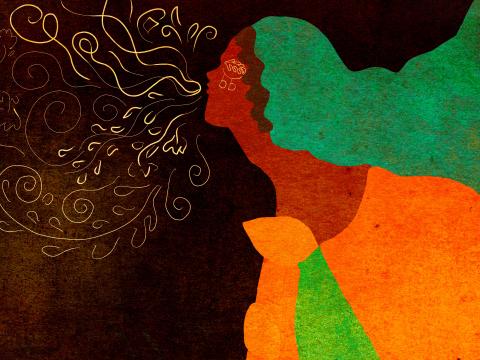Amal’s Journey of Healing: Breathing to Find Comfort After Great Loss

“Salim had big green eyes and a nice long face. He had handsome facial features and a beautiful brown complexion. No matter how much I tell you, I cannot describe how handsome he was. And he had a very kind spirit.”
For Amal, 47, Salim was not only her eldest son but also her best friend. After the loss of her husband seventeen years ago due to a terminal illness, Salim became a friend, supporter, and companion to Amal.
But tragedy returned to Amal with devastating force, when Salim was killed working at a factory in the heart of Mosul two years ago.
Amal changed greatly. “I started to experience a psychological decline. I was in a state of sadness and would often burst out crying. It was a tragedy. I could not sleep or eat. It was a sudden loss for my children and me. That year, all my children couldn’t focus on their education, and they failed their final exams at school,” said Amal bitterly.
Tragedy became a catalyst of hardship. Amal’s four children couldn’t continue their education, and Amal struggled to stand on her feet and support her children. In those days, people in her neighborhood came to her asking her to tailor or bake, but she couldn’t work on anything because she was immersed in sadness.
However, Amal felt responsible for helping her children who were struggling to function well in their daily lives. She started to talk to her children about their loss. Amal said, “I pulled myself together, and I remembered when my husband died, I went through the same. I carried all the responsibilities on my shoulders then. It is fate, and it happens to all of us. I started to pray and read the Quran.”
A few months after her loss, Amal started to learn about World Vision Iraq and got to know Amna, the World Vision Iraq Community Mobiliser for the Safe Return Project, an Australian Aid initiative implemented by World Vision Iraq on behalf of the Australian Government. Through this project in Mosul and Hamdaniyah, World Vision supports micro, small, and medium enterprises, organises savings groups, and also provides psychosocial support to the participants through ‘problem management plus’ sessions.
Amal was admitted into the project, and she started to join the sessions for the savings group as well as receiving psychosocial support. Amal said, “At that time, my face was filled with sadness, and I couldn’t even smile. But slowly, slowly, I started to go out and I continued the sessions with them. Amna ran the sessions and we performed breathing exercises. These were very good.”
Amna noted the change in Amal, “I remember when she attended the sessions at our space. It was five months after her son was killed in the accident. Her face has now completely transformed. She wasn’t smiling at all then. But now she receives us at her home and smiles at us.”
Amal started to have savings group sessions with seven other women. Savings groups comprise community members who agree to save and deposit a certain amount of money periodically into the savings. By turn, each member gets the right to withdraw the sum of money after a certain period, and the cycle continues for each member. Every month, Amal saved between 3,000 to 10,000 Iraqi Dinars (2.29 to 7.64 USD). When her turn came to collect the savings, Amal used the money to support her children with school supplies.
Amal reflected, “The women in the savings group and Amna helped me a lot. They started to talk, crack jokes, and laugh. It was a psychological and financial improvement for me.”
These days, Amal feels a measure of contentment, and often smiles. She feels happy that her children are doing well in life and are continuing their education.
But Salim doesn’t leave her memory. “I still miss seeing him. I miss his voice, his teasing, and his calling me Mama. When I remember him, I feel very sad. It affected me a lot. I’ve had two tragedies in life.”
These days, whenever Amal is anxious and feels heaviness in her chest, she does the breathing exercises. “When I have an anger or sadness episode, I sit alone and do the breathing exercise. It helps me gain emotional comfort. I didn’t know anything like this before. It is my first time participating with an organisation, and I didn’t know about these things.”
On World Mental Health Day, Amal, a name in Arabic meaning hope, said, “If someone stays alone, their sadness gets deeper. Talking to Amna and others helped me get more comfortable in my heart. I was very sad; I could not even reach my house door. It was such an unexpected tragedy. But with seeing people, my situation changed. I encourage people who experience sadness or a decline in their psychological state to change their lives and get treatment. Everyone experiences some shock, and they must help change their lives.”
The Safe Return project has been providing Mental Health and Psychosocial Support services to project participants using the Group Problem Management Plus (GPM+) intervention. GPM+ is a brief psychosocial intervention developed by the World Health Organisation to support individuals and communities affected by stress, loss, and trauma. It aims to improve the mental health and wellbeing of individuals by helping them to identify and address the practical and emotional problems they are facing. The sessions are structured and are provided in five sessions with 6-10 participants.
Throughout the last four years, the project has provided GPM+ sessions to 1,388 participants (931 women, 364 men, 72 women living with disabilities, and 21 men living with disabilities).
Through GPM+ sessions, participants like Amal learned how to deal with emotions and loss, manage stress through deep breathing relaxation techniques, break the cycle of inactive living, and access additional psychosocial support by activating social links and relationships.